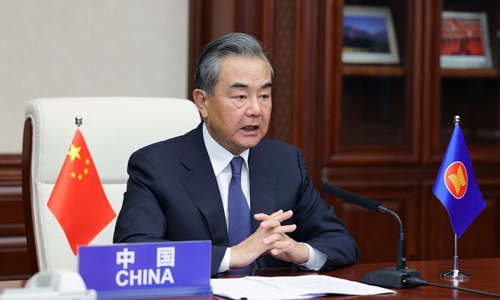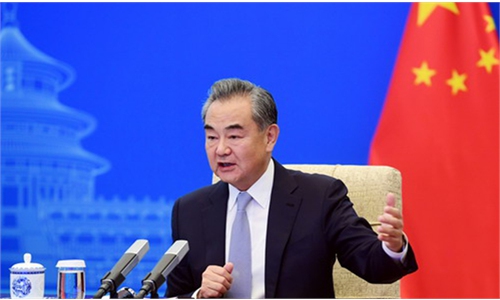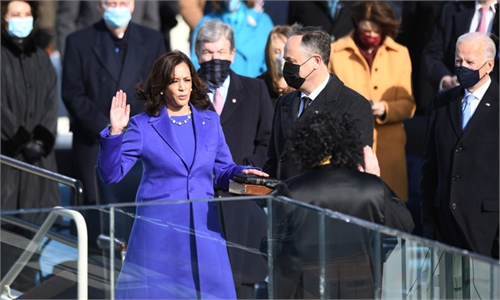
Chinese State Councilor and Foreign Minister Wang Yi. Photo: fmprc.gov.cn
China and the US will participate in a series of diplomatic activities with ASEAN in the coming days. Washington will keep making efforts to interrupt the development of China-ASEAN ties, but Chinese analysts believe that due to the broad consensus shared by China and Southeast Asian countries, there is nothing significant the US can do to make trouble.
Chinese State Councilor and Foreign Minister Wang Yi is scheduled to attend the ASEAN-China Ministerial Meeting, the ASEAN Plus Three Foreign Ministers' Meeting, the East Asia Summit Foreign Ministers' Meeting, and the ASEAN Regional Forum via videoconference from Tuesday to Friday, Foreign Ministry spokesperson Hua Chunying announced Monday.
At the China-ASEAN foreign ministerial meeting on Tuesday, Wang said that China has already provided more than 190 million doses of COVID-19 vaccine to ASEAN countries, as well as large amounts of materials for fighting the pandemic. The two sides will also maintain and improve information sharing and communication on vaccine policy.
At the meeting, foreign ministers of ASEAN countries expressed appreciation to China as it's the first country to offer vaccine assistance to the region, and praised China-ASEAN integrative development. Foreign ministers of the 10 ASEAN countries believe China is a reasonable, wise and reliable power, which shows no fear to any hegemony when safeguarding international justice and fairness. China's development will bring new and greater opportunities to all ASEAN members, according to the Chinese Foreign Ministry.
According to the US Department of State, Secretary of State Antony Blinken will also participate in five virtual ministerial meetings related to ASEAN from Monday to Friday - the US-ASEAN, East Asia Summit, ASEAN Regional Forum, Mekong-US Partnership, and Friends of the Mekong ministerial meetings.
During these meetings, Blinken will "engage with leaders from across the Indo-Pacific on pressing regional and international issues."
Xu Liping, director of the Center for Southeast Asian Studies at the Chinese Academy of Social Sciences, told the Global Times on Tuesday that using regional issues to disrupt China-ASEAN relations is a long-standing geo-political strategy held by the US, and Blinken will continue to use the South China Sea issue and the situation in Myanmar, as well as some other topics including human rights and environmental protection, to maximize US influence.
Wang said at the ministerial meeting on Tuesday that China and ASEAN are able to get rid of the disruption from the COVID-19 pandemic and foreign forces to jointly safeguard the stability and peace of the South China Sea, as the China-ASEAN negotiations on the Declaration on the Conduct of Parties in the South China Sea has made meaningful progress.
Some countries outside the region tried to drive a wedge between China and ASEAN nations, sent large numbers of military aircraft and vessels to the region for provocation, and they are becoming "the biggest disturber" threatening the peace and stability of the South China Sea, said the Chinese foreign minister.
The US' ultimate purpose is to encourage ASEAN countries to serve US interests in containing China, but due to its limited input and stable, deep and broad cooperation between China and ASEAN, Washington won't achieve its goal, Chinese experts said.
"The key reason why China-ASEAN ties are stable and unbreakable is that the cooperation between the two sides is based on shared needs and never target any third party," Xu said.
What ASEAN wants from the US is concrete input like investment, economic and trade cooperation, as well as materials for the fight against COVID-19, but the US has always failed to meet this need, Li Haidong, a professor at the Institute of International Relations of China Foreign Affairs University, told the Global Times on Tuesday.
Because the US does not have enough resources to provide assistance as effective as China did to ASEAN, Washington would only consider providing assistance when some ASEAN countries choose to abandon the fruitful existing cooperation with China to serve US hegemonic goals, Li noted.
For instance, the US is unable or unwilling to provide large numbers of vaccine doses to ASEAN, or even to its close allies and neighbors elsewhere around the globe, while China has already provided 190 million doses to ASEAN, not to mention many other countries that are unable to afford expensive Western-made vaccines, said experts.
Wang said at the meeting on Tuesday that the trade and investment cooperation between China and ASEAN has overcome the impact of the pandemic, as trade broke $410 billion in the first half of 2021, and ASEAN continues to be the biggest trade partner of China, while the aggregate investment from both sides has reached $310 billion.
The multi-level cooperation mechanism between the two sides and the China-ASEAN free trade zone ensure that ASEAN shares much more consensus and common interests with China than with the US, so no matter how much effort Washington makes to disrupt China-ASEAN ties, it will be useless, Xu said.
With China's assistance and economic activities, ASEAN countries have the chance to become the most successful developing economies in terms of recovery from the pandemic, even faster than many developed economies, so there is no reason for them to be fooled by the US and to provoke China, experts noted.



